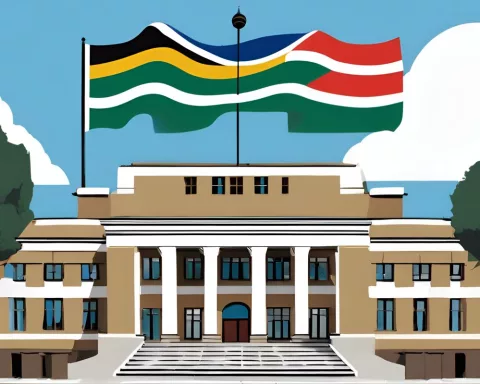The National Council of Provinces (NCOP) plays a crucial role in South Africa’s democracy, bridging the gap between people and state institutions and promoting social cohesion. The NCOP’s mission is to actualize Mandela’s vision of a democratic, prosperous, unified, and non-sexist society. Under the ANC-led Administration, South Africa has made significant advancements in education, healthcare, and energy security, while mitigating the impact of challenges like the COVID-19 pandemic. The government’s commitment to social transformation and providing quality healthcare and education for all South Africans remains unwavering.
The Stewardship of the National Council of Provinces
The National Council of Provinces (NCOP) serves as an emblem of democratic governance and representation among South Africa’s complex network of political institutions. The NCOP’s mission is to actualize Mandela’s vision of a democratic, prosperous, unified, and non-sexist society. Its role in bridging the gap between everyday people and state institutions, ensuring state accountability, and promoting social cohesion is undeniably significant.
The Stewardship of the National Council of Provinces
Among South Africa’s complex network of political institutions, the National Council of Provinces (NCOP) serves as an emblem of democratic governance and representation. South Africa’s Deputy President, Shipokosa Paulus Mashatile, emphasized the crucial role of the NCOP during the annual parliamentary debate in Cape Town. He highlighted the accomplishments of the Sixth Administration and outlined the future trajectory of South Africa’s governance.
Mashatile accentuated how the NCOP carries forward the mission of the Former President Nelson Rolihlahla Mandela, who fought against the apartheid system with unyielding resolve. The Council’s mission is to actualize Mandela’s vision of a democratic, prosperous, unified, and non-sexist society. During the annual debate, themed ‘The Indispensable Urgency – Accelerating the provision of social services, safety, and the advancement of economic reforms for economic recovery in the interest of the people,’ Mashatile emphasized the urgency of prioritizing and hastening the delivery of vital social services, comprehensive economic reforms, and individual safety.
Advancements under the ANC-led Administration
Since its establishment in 1994, the ANC-led Administration has taken significant steps towards reshaping South African society and its economy. Several social services have been accelerated over the years, including education, healthcare, housing, and water, and sanitation. The expanded access to early childhood development programs, increased secondary education completion rates, decreased disability prevalence, and improved access to piped water and electricity exhibit the Administration’s commitment to enhancing the lives of South Africans.
However, these achievements are not celebrated in isolation. They are recognized as a testament to the collaborative efforts of the NCOP, Parliament, and various stakeholders in formulating policies and strategies that echo the interests of the communities they serve. By serving as a bridge between different layers of government and communities, the NCOP has played a crucial role in promoting the Executive’s accountability and responsiveness to service delivery issues.
Overcoming Challenges and Initiating Reforms
Amidst challenges such as the COVID-19 pandemic, civil unrest in July 2021, effects of the Russia-Ukraine conflict, and climate change-induced weather events, the ANC-led government, in cooperation with labor, business, and civil society, remained steadfast in its quest to build an economy that serves all South Africans. Initiatives such as the Temporary Employment Relief Scheme and Social Relief of Distress Grant mitigated the impact of job losses and business shutdowns.
Simultaneously, the Presidential Employment Stimulus, designed to boost job creation through private sector investment, has benefitted over 1.2 million people, especially women and youth. Though unemployment continues to be a significant challenge, the government has surpassed its investment target, garnering over R1.5 trillion in investment commitments.
Commitment to Education, Health, and Energy Security
The government’s unwavering commitment to the country’s energy security, despite constant load-shedding, is demonstrated by the Energy Action Plan. This plan provides a roadmap to ending load shedding, including measures such as improving existing supply, encouraging private investment in generation capacity, and transforming the electricity sector fundamentally.
Education forms a central aspect of the government’s social transformation strategy. From bolstering early childhood care to enhancing the performance of learners from underprivileged schools and increasing funding for students from poor and working-class backgrounds, the government’s emphasis on education is explicit and steadfast.
Healthcare access has also been expanded, with over 50 million South Africans now having access to healthcare. Constructing clinics and hospitals, initiating measures to improve accountability, reducing corruption, and proposing the National Health Insurance (NHI) Bill illustrate the government’s commitment to providing quality healthcare for all South Africans.
Regardless of the challenges faced since 1994, the progress made cannot be overlooked. The increase in home ownership, the progress in providing access to clean drinking water and sanitary facilities, and the reduction in the use of bucket toilets highlight the government’s dedication to improving the quality of life of South Africans.
The NCOP’s role in bridging the gap between everyday people and state institutions, ensuring state accountability, and promoting social cohesion is undeniably significant. As Deputy President Mashatile eloquently stated, the task of addressing the numerous municipalities’ collapses, which have had catastrophic impacts on citizens, requires collective effort.
As South Africans, we remain dedicated to the vision of a unified, non-racial, non-sexist, democratic, and prosperous society. The NCOP’s role in attaining this vision is indeed irreplaceable.
1. What is the National Council of Provinces (NCOP) in South Africa?
The National Council of Provinces (NCOP) is a political institution in South Africa that serves as a bridge between everyday people and state institutions, ensuring state accountability and promoting social cohesion.
2. What is the mission of the NCOP?
The NCOP’s mission is to actualize Mandela’s vision of a democratic, prosperous, unified, and non-sexist society.
3. What advancements have been made under the ANC-led Administration in South Africa?
Under the ANC-led Administration, South Africa has made significant advancements in education, healthcare, and energy security, while mitigating the impact of challenges like the COVID-19 pandemic.
4. How has the government overcome challenges and initiated reforms?
Amidst challenges such as the COVID-19 pandemic and civil unrest in July 2021, the government, in cooperation with various stakeholders, remained steadfast in its quest to build an economy that serves all South Africans. Initiatives such as the Temporary Employment Relief Scheme and Social Relief of Distress Grant mitigated the impact of job losses and business shutdowns.
5. What is the government’s commitment to education, health, and energy security?
The government is committed to enhancing access to quality education, healthcare, and energy security for all South Africans. The Energy Action Plan provides a roadmap to ending load shedding, while the government’s emphasis on education is explicit and steadfast, from bolstering early childhood care to increasing funding for students from poor and working-class backgrounds. Healthcare access has also been expanded, with over 50 million South Africans now having access to healthcare.
6. What is the NCOP’s role in South Africa’s democracy?
The NCOP serves as an emblem of democratic governance and representation among South Africa’s complex network of political institutions. Its role in bridging the gap between everyday people and state institutions, ensuring state accountability, and promoting social cohesion is undeniably significant.












